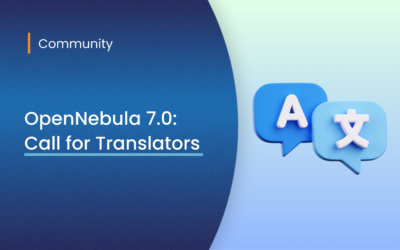As many of you know, a new open-source cloud platform, OpenStack, was recently announced. Here at OpenNebula, we think this is a very exciting development in the cloud community, and we’re glad to see so many major players coalescing around an open-source solution. However, we have also been concerned by the all the high-profile announcements and opinion pieces that describe OpenStack as the first initiative for the definition of an open architecture for IaaS cloud computing and a “real” open-source project, criticizing some existing open-source cloud projects as being “open-core” closed initiatives (in some cases conflating “open-core” with “having an Enterprise edition”), and pointing out their lack of extensibility and inability to efficiently scale to manage tens of thousand of VMs. This is the reason why we have decided to write this post in order to clearly state our position in order to avoid misunderstandings, particularly with our growing community of users.
OpenNebula is and always will be 100% Apache-licensed Open-Source Software
OpenNebula was first established as a research project back in 2005, with first public release in March 2008. We have a strong commitment with open-source, being one of the few cloud management tools that are available under Apache license. The Apache license allows any Cloud and virtualization player to innovate using the technology without the obligation to contribute those innovations back to the open source community (although we encourage that this work be contributed back to the community). This is the case for many third-party commercial products that embed OpenNebula.
OpenNebula is NOT “Open Core”
C12G Labs is a new start-up that has been created to provide the professional integration, certification and technical support that many enterprise IT shops require for internal adoption and to allow the OpenNebula project to not be tied exclusively to public financing (research grants, etc.), contributing to its long-term sustainability. Although C12G Labs does provide an Enterprise edition of OpenNebula, all software extensions and patches created by C12G (distributed in the Enterprise Edition of OpenNebula to support customers and partners) are fully contributed back to OpenNebula and its ecosystem under an OSI-compliant license. So OpenNebula is NOT a feature or performance limited edition of the Enterprise version. C12G Labs contributes to the sustainability of the community edition and is committed to enlarge the OpenNebula community. C12G Labs dedicates an amount of its own engineering resources to support and develop OpenNebula and so to maintain OpenNebula’s position as the leading and most advanced open-source technology to build cloud infrastructures.
OpenNebula is an Open-Source Community
The OpenNebula technology has matured thanks to an active and engaged community of users and developers. OpenNebula development is driven by our community in order to support the most demanded features and by international research projects funding OpenNebula in order to address the demanding requirements of several business and scientific use cases for Cloud Computing. We have also created the OpenNebula ecosystem where related tools, extensions and plug-ins are available from and for the community.
OpenNebula is a Production-ready and Highly-scalable Technology
OpenNebula is an open-source project aimed at developing a production-ready cloud management tool for building any type of Cloud deployment, either in scientific or in business environments. OpenNebula releases are tested to assess its scalability and robustness in large scale VM deployments, and under stress conditions. Of course, you don’t have to take our word for it: several users have reported excellent performance results to manage tens of thousands of VMs. We have been encouraging some of these users to write on our blog about their experiences with OpenNebula. So far, you can read this recent blog post on how OpenNebula is being used at CERN, with more user experiences blog posts to follow soon.
OpenNebula is a Flexible and Extensible Toolkit
Because two datacenters are not the same, OpenNebula offers a open, flexible and extensible architecture, interfaces and components that fit into any existing data center; and enable its integration with any product and service in the Cloud and virtualization ecosystem, and management tool in the datacenter. OpenNebula is a framework, you can replace and adapt any component to efficiently work in any environment.
OpenNebula is Hypervisor Agnostic and Standards-based
OpenNebula provides an abstraction layer independent from underlying services for security, virtualization, networking and storage, avoiding vendor lock-in and enabling interoperability. OpenNebula is not only built on standards, but has also provided reference implementation of open community specifications, such us the OGF Open Cloud Computing Interface. OpenNebula additionally leverages the ecosystems being built around most popular cloud interfaces, Amazon AWS, OGC OCCI and VMware vCloud
OpenNebula Implements an Open Architecture Defined by Major Players in the Cloud Arena
OpenNebula is the result of many years of research and the interaction with some of the major players in the Cloud arena. This technology has been designed to address the requirements of business use cases from leading companies in the context of flagship international projects in cloud computing. The main international project funding OpenNebula is RESERVOIR. OpenNebula is an implementation of the IaaS management layer of the RESERVOIR open architecture defined by its partners: IBM, Telefonica Investigacion y Desarrollo, University College of London, Umeå University, SAP AG, Thales Services SAS, Sun Microsystems Germany, ElsagDatamat S.p.A, Universidad Complutense de Madrid, CETIC, Universita Della Svizzera italiana, Universita degli Studio di Messina, and the European Chapter of the Open Grid Forum. The outcome of this collaboration is the unique functionality provided by OpenNebula.
OpenNebula will Continue Incorporating State-of-the-Art Features Demanded by Major Players
OpenNebula is used, together with other software components, in new international innovative projects in Cloud Computing. StratusLab with the participation of Centre National de la Recherche Scientifique, Universidad Complutense de Madrid, Greek Research and Technology Network S.A., SixSq Sárl, Telefonica Investigacion y Desarrollo and Trinity College Dublin, aimed at bringing cloud and virtualization to grid computing infrastructures. BonFIRE with the participation of Atos Origin, University of Edinburgh, SAP AG, Universitaet Stuttgart, FRAUNHOFER, Interdisciplinary Institute for Broadband Technology, Universidad Complutense de Madrid, Fundacio Privada I2CAT, Hewlett-Packard Limited, The 451 Group Limited, Technische Universitaet Berlin, IT-Innovation, and Institut National de Recherche en Informatique et en Automatique, aimed at designing, building and operating a multi-site cloud-based facility to support research across applications, services and systems targeting services research community on Future Internet;. And many others, such as 4CaaSt with the participation of UPM, 2nd Quadrant Limited, BonitaSoft, Bull SAS, Telefónica Investigación y Desarrollo, Ericsson GMBH, FlexiScale, France Telecom, Universitat St Gallen, ICCS/NTUA, Nokia Siemens Networks, SAP AG, Telecom Italia, UCM, Universitaet Stuutgart, UvT-EISS, and ZIB, aimed at creating an advanced PaaS Cloud platform which supports the optimized and elastic hosting of Internet-scale multi-tier applications.
* * *
All that said, we’d like to reiterate that we strongly support initiatives like OpenStack. This open source initiative is fully aligned with our vision on what the cloud ecosystem should look like, and we will be happy to contribute to OpenStack with our significant track record in open source and scalable cloud computing management, and with an implementation of the open APIs that will be defined in the context of the OpenStack architecture. However, we felt that some of the buzz surrounding OpenStack unfairly characterized existing open source efforts, and felt it was necessary to reiterate our commitment to an open source cloud ecosystem.
Ignacio M. Llorente, on behalf of the OpenNebula project
Disclaimer: The above represent our position, and may not reflect the positions of any of the projects and organizations referenced in the post.




Yes! Very nicely addressed. I had similar trouble with much of the OpenStack buzz and some of the more official statements. While OpenStack is remarkable and positive for the cloud computing industry in a number of dimensions, claims like “absolutely no lock-in,” “*real* open source,” and “first open architecture” were a bit much. There are already more than a dozen other strong players in the space (http://www.neovise.com/node/101) – some are very worthy competitors.
Paul
As I noticed on linkedin in quoting the David Chernicoff:
“With the announcement from RackSpace this week about their OpenStack open source cloud computing environment, the issue of the importance of open source software in the cloud is likely to become another bone of contention for cloud technology adopters. But frankly, I think it’s a minor one, despite the online aggravation it is likely to generate.
The vast majority of people following the progress of cloud technologies are going to be consumers of cloud services, not creators. To them, it is the service that will matter, not the underlying technologies. As technologists, we have an annoying tendency to get swept up with our own personal beliefs and and a fascination with what’s cool at the moment, especially those of us who evaluate technology and write about it on a regular basis.
But this is an issue that needs to be looked at from the business perspective and not the IT view. It just doesn’t matter what the back end is as long as it delivers the services that our users need. Unless we are hosting and creating our own cloud services, the technology that drives the cloud is far less important than the business value of the delivered services.”
I re-iterated many times: The success of an open source will reside in it’s commercial adoption. The paying customers are the result of an eco-system of players They pay support and subscriptions for a specific need teh customer chain has.
“So whether the cloud application that is driving the business forward is running on OpenStack, Azure, VMware, RedHat Enterprise, or CP/M (or Open Nebula) isn’t an issue to consumers of cloud services. Results are all that matter.”
Hello Dr. Ignacio
Clear Statement!
In my view, the following features is the most important:
1 Apache License
2 offering Enterprise Level Cloud Functions
3 the stronger researcher and partners
4 the increasing community users and feedbacks
–Tang Yong
Hello Dr. Ignacio
I have a problem as followings:
RackSpace(nova) uses AMQP(Rabbit MQ) as communition way between the cloud controller and the Node…
So, I wonder that whether Opennebula ever considered the communition way(message-orriented) or not?
Maybe the problem should be not placed here.
–Tang
Please send this technical question to our user mailing list, Thanks!
Unfortunately we did not control the buzz around OpenStack. Some of it went in directions I did not agree with. I hope that nothing that I have said has contributed to any misunderstanding. If it has, I apologize and would be glad to help clear it up.
Rick
Thanks!. Everything is clear. Looking forward to collaborating, Ignacio
Rick: Just to be clear, we didn’t mean to say that OpenStack was directly responsible for all the “OpenStack is the One True Open Source Cloud Stack” and “Anyone with an Enterprise Edition sux0rz!” buzz, but that ended up how many commentators spun the news of OpenStack’s release. So, we felt it was necessary to proactively clarify our position, particularly given that we do have an Enterprise Edition (which, as clarified above, is not an “evil” enterprise edition).
In any case, we really, truly, honestly appreciate your kind words on your post. After what feels like preaching in the desert for so long, it’s nice to see so many major players suddenly get behind our same vision for an open source cloud computing ecosystem.
I’m excited there are more options for open source cloud software now, and the list and compatibility is growing.